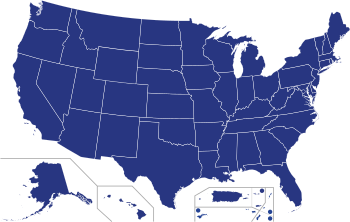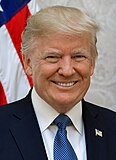
A | B | C | D | E | F | G | H | CH | I | J | K | L | M | N | O | P | Q | R | S | T | U | V | W | X | Y | Z | 0 | 1 | 2 | 3 | 4 | 5 | 6 | 7 | 8 | 9
| ||||||||||||||||||||||
2,550 delegate votes (2,443 pledged and 107 unpledged) to the Republican National Convention[1] 1,276[1] delegates votes needed to win | ||||||||||||||||||||||
|---|---|---|---|---|---|---|---|---|---|---|---|---|---|---|---|---|---|---|---|---|---|---|
| ||||||||||||||||||||||
 First place by first-instance vote
| ||||||||||||||||||||||
| ||||||||||||||||||||||
2020 U.S. presidential election | |
|---|---|
| Attempts to overturn | |
| Democratic Party | |
| Republican Party | |
| Third parties | |
| Related races | |
| |
Presidential primaries and caucuses of the Republican Party took place in many U.S. states, the District of Columbia, and five U.S. territories from February 3 to August 11, 2020, to elect most of the 2,550 delegates to send to the Republican National Convention. Delegates to the national convention in other states were elected by the respective state party organizations. The delegates to the national convention voted on the first ballot to select Donald Trump as the Republican Party's nominee for president of the United States in the 2020 election, and selected Mike Pence as the vice-presidential nominee.
President Donald Trump informally launched his bid for reelection on February 18, 2017. He launched his reelection campaign earlier in his presidency than any of his predecessors did. He was followed by former governor of Massachusetts Bill Weld, who announced his campaign on April 15, 2019, and former Illinois congressman Joe Walsh, who declared his candidacy on August 25, 2019. Former governor of South Carolina and U.S. representative Mark Sanford launched a primary challenge on September 8, 2019. In addition, businessman Rocky De La Fuente entered the race on May 16, 2019, but was not widely recognized as a major candidate.
In February 2019, the Republican National Committee voted to provide undivided support to Trump.[5][6] Several states canceled their primaries and caucuses.[7] Other states were encouraged to use "winner-takes-all" or "winner-takes-most" systems to award delegates instead of using proportional allocation.[8][9]
Trump became the presumptive Republican presidential nominee on March 17, 2020, after securing a majority of pledged delegates.[10] Donald Trump received over 18 million votes in the Republican primary, the most ever for an incumbent president in a primary as well as the most for any Republican in a presidential primary.[citation needed]
Primary race overview
Numerous pundits, journalists and politicians speculated that President Donald Trump might face a significant Republican primary challenger in 2020 because of his historic unpopularity in polls, his association with allegations of Russian interference in the 2016 United States elections, his impeachment, and his support of unpopular policies.[11][12][13] In August 2017, reports arose beginning that members of the Republican Party were preparing a "shadow campaign" against the president, particularly from the moderate or establishment wings of the party. Then-Arizona senator John McCain said, "Republicans see weakness in this president."[14][15] Maine senator Susan Collins, Kentucky senator Rand Paul, and former New Jersey governor Chris Christie all expressed doubts in 2017 that Trump would be the 2020 nominee, with Collins stating "it's too difficult to say."[16][17] Former U.S. senator Jeff Flake claimed in 2017 that Trump was "inviting" a primary challenger by the way he was governing.[18] However, longtime political strategist Roger Stone predicted in May 2018 that Trump might not seek a second term were he to succeed in keeping all his campaign promises and "mak America great again".[19]
Some prominent Trump critics within the GOP, including 2016 presidential candidate Carly Fiorina,[20] former senator Jeff Flake,[21] and former Massachusetts governor and current U.S. senator Mitt Romney[22] stated they would not run against Trump for the nomination in 2020.
In 2017, there were rumors of a potential bipartisan ticket consisting of Republican Ohio governor and 2016 presidential candidate John Kasich and Democratic Colorado governor John Hickenlooper.[23] Kasich and Hickenlooper denied those rumors.[24][25] In November 2018, however, Kasich asserted that he was "very seriously" considering a White House bid in 2020.[26] In August 2019, he indicated that he did not see a path to win over Trump in a Republican primary at that time, but that his opinion might change in the future.[27]
On January 25, 2019, the Republican National Committee unofficially endorsed Trump.[28]
After re-enrolling as a Republican in January 2019,[29] former Republican governor of Massachusetts and 2016 Libertarian vice presidential nominee Bill Weld announced the formation of a 2020 presidential exploratory committee on February 15, 2019.[30] Weld announced his 2020 presidential candidacy on April 15, 2019.[31] Weld was considered a long-shot challenger because of Trump's popularity with Republicans; furthermore, Weld's views on abortion rights, gay marriage, marijuana legalization, and other issues conflict with socially conservative positions dominant in the modern Republican party.[32] Weld withdrew from the race on March 18, 2020, after Trump earned enough delegates to secure the nomination.[33]
Former U.S. representative Joe Walsh was a strong Trump supporter in 2016, but gradually became critical of the president. On August 25, 2019, Walsh officially declared his candidacy against Trump, calling Trump an "unfit con man".[34] He then ended his campaign on February 7, 2020, following a poor performance in the Iowa Caucuses. Walsh called the Republican Party a "cult" and said that he likely would support whoever was the Democratic nominee in the general election.[35] According to Walsh, Trump supporters had become "followers" who think that Trump "can do no wrong", after absorbing misinformation from conservative media. He stated, "They don't know what the truth is and—more importantly—they don't care."[36]
Former South Carolina governor and former U.S. representative Mark Sanford officially declared his candidacy on September 8,[37] but suspended his campaign two months later on November 12, 2019, after failing to gain significant attention from voters.[38]
Despite the mostly nominal status of his opposition, Trump campaigned during this primary season, holding rallies in the February primary and Super Tuesday states.[39][40]
The president won every primary by wide margins and clinched the nomination shortly after the Super Tuesday primaries ended. While the results were never in doubt, the primary wasn't without controversy. Several states postponed their primaries/caucuses due to the COVID-19 pandemic, and others continued with in-person voting[41][42][43][44][45] while Trump's claims about fraud related to by-mail voting discouraged expansion and promotion of such voting.[46]
Candidates
Nominee
| Name | Born | Most recent position | Home state | Announcement date | Campaign Withdrawal date |
Bound delegates[47] |
Popular vote[47] | Contests won | Running mate | Ref. | |
|---|---|---|---|---|---|---|---|---|---|---|---|
| Soft count[d] | Hard count[e] | ||||||||||
 Donald Trump |
June 14, 1946 (age 74) Queens, New York |
45th President of the United States (2017–2021) Incumbent |
 Florida[49][f] |
June 18, 2019[50] | Campaign Secured nomination: March 17, 2020 |
2,310 (90.59%) |
2,339 (91.73%) |
18,159,752 (93.99% ) |
56 (AK, AL, AR, AS, AZ, CA, CO, CT, DC, DE, FL, GA, GU, HI,[51] IA,[52] ID, IL, IN, KS,[53] KY, LA,MA, MD, ME, MI, MN, MO, MP, MS, MT, NC, ND, NE, NH,[54] NJ, NM, NV,[55] NY,[56] OH, OK, OR, PA, PR, RI, SC, SD, TN, TX, UT, VA, VI, VT, WA, WI, WV, WY) |
Mike Pence | [57] |
Other candidates
The people in this section were considered to be major candidates.
Zdroj:https://en.wikipedia.org?pojem=2020_Republican_Party_presidential_primariesText je dostupný za podmienok Creative Commons Attribution/Share-Alike License 3.0 Unported; prípadne za ďalších podmienok. Podrobnejšie informácie nájdete na stránke Podmienky použitia.
Antropológia
Aplikované vedy
Bibliometria
Dejiny vedy
Encyklopédie
Filozofia vedy
Forenzné vedy
Humanitné vedy
Knižničná veda
Kryogenika
Kryptológia
Kulturológia
Literárna veda
Medzidisciplinárne oblasti
Metódy kvantitatívnej analýzy
Metavedy
Metodika
Text je dostupný za podmienok Creative
Commons Attribution/Share-Alike License 3.0 Unported; prípadne za ďalších
podmienok.
Podrobnejšie informácie nájdete na stránke Podmienky
použitia.
www.astronomia.sk | www.biologia.sk | www.botanika.sk | www.dejiny.sk | www.economy.sk | www.elektrotechnika.sk | www.estetika.sk | www.farmakologia.sk | www.filozofia.sk | Fyzika | www.futurologia.sk | www.genetika.sk | www.chemia.sk | www.lingvistika.sk | www.politologia.sk | www.psychologia.sk | www.sexuologia.sk | www.sociologia.sk | www.veda.sk I www.zoologia.sk


